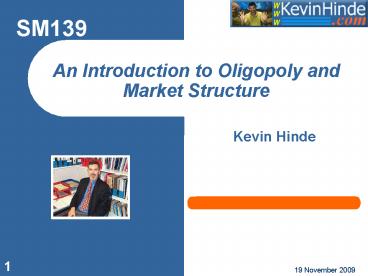An Introduction to Oligopoly and Market Structure - PowerPoint PPT Presentation
1 / 14
Title:
An Introduction to Oligopoly and Market Structure
Description:
Some oligopoly markets characterised by some dominant players and a fringe' ... Note that the oligopolist faces a kink in their demand curve because of the ... – PowerPoint PPT presentation
Number of Views:408
Avg rating:3.0/5.0
Title: An Introduction to Oligopoly and Market Structure
1
An Introduction to Oligopoly and Market Structure
SM139
- Kevin Hinde
2
What is Oligopoly?
- Few sellers in the market, many buyers. These few
sellers have large market shares. - Some oligopoly markets characterised by some
dominant players and a fringe. - Perhaps Strategic Groups apply.
- Sellers usually supplying differentiated
products. Non-price competition mainly prevails - Large entry barriers to the industry.
3
What is oligopoly?
- Interdependence between the sellers is an
important characteristic, - E.g. if one seller introduces a new design or
modifies an existing one then there is usually a
response. - It is the dominant market form in the private
sector. - Examples include
- Sugar, Computer Operating Systems, The Package
Holiday Industry, Accountancy, Motor Vehicles,
Brewing.
4
The UK Brewing Industry
Source Sloman, Economics
5
The Kinked Demand Curve A very Simple Oligopoly
Model
Why are prices reasonably stable in oligopoly?
Firms cannot raise their price without losing
large market share. If they lower their price
their gain is not great because of customer
loyalty to (now) higher priced brands. Sellers
are facing 2 demand curves. One elastic the other
inelastic.
Price
0
Quantity
6
The Kinked Demand Curve A very Simple Oligopoly
Model
Price
With two demand curves there are 2 marginal
revenue curves.
MRi
MRe
0
Quantity
7
The Kinked Demand Curve A very Simple Oligopoly
Model
Price
Note that the oligopolist faces a kink in their
demand curve because of the variations in
elasticity above and below price P.
P
D
MR
0
Q
Quantity
8
The Kinked Demand Curve A very Simple Oligopoly
Model
Price
Note that the oligopolist has scope to change
costs without any effect on price and quantity.
P
D
MR
0
Q
Quantity
9
An example. Petrol Prices are stable but no
cartel exists
Source http//www.oft.gov.uk/news/pressreleases/
2001/pn42a-01.htm
10
The Cartel
- A cartel is an explicit agreement between firms
to control price and / or market share. The
cartel acts as a multi-plant monopolist
restricting consumer choice and damaging economic
welfare. - There are many types of cartel. At one extreme is
the centralised cartel. This is perfect collusion
in that the cartel makes all the decisions for
firms. - An alternative is a market sharing cartel. Here
firms carve up the monopoly output at the
monopoly price.
11
The centralised cartel
P
Pcartel
D
MR
0
Q
Qcartel
12
- Cartels are most likely to occur where
- there are few firms for the participants to
police, - where costs and products are fairly similar and
- where the economic environment is relatively
stable. - Cartels can be horizontal or vertical.
13
A vertical cartel Nintendo and its distributors
Source European Commission
14
Some on-line sites to help you learn.
- The Office of Fair Trading
- http//www.oft.gov.uk
- The Competition Commission
- http//www.competition-commission.org.uk
- DGiv The European Competition Directorate
- http//europa.eu.int/comm/competition/index_en.htm
l - Try these multiple choice questions from Bized
- http//www.bized.ac.uk/stafsup/options/qbank/page1
0.htm































